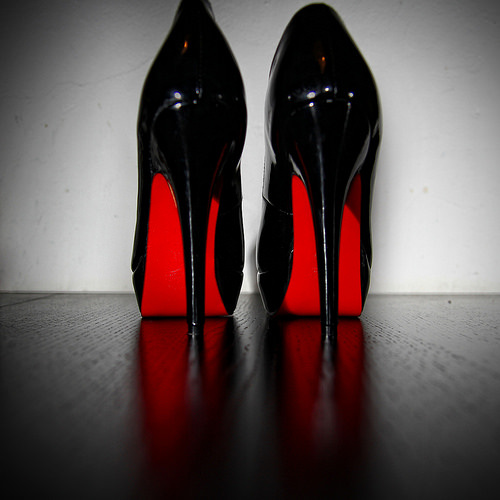A British temp worker, Nicola Thorp, was informed that she needed to wear high heels to work as a temporary receptionist at PricewaterhouseCoopers in London. The temp agency that hired her, Portico, did not allow female workers to wear flat shoes on the job. Flats were fine for men, though.
Here are a few reasons why no one should wear heels at work or be required to wear heels at work:
Heels are uncomfortable
The higher the heel, the more uncomfortable the shoe. Heels of all heights increase the pressure on the ball of the foot while simultaneously crushing the toes into a point. There isn't a woman out there who doesn't know this to be true if she has ever worn heels. Just walk around in a pair for a whole day and you'll know that special pain.
Heels damage your health
Bad things happen to your feet, ankles, knees and back when you wear heels. According to the American Osteopathic Association, "high heels are one of the biggest factors leading to foot problems in women, with up to a third suffering permanent problems as a result of prolonged wear." The narrow toe box of the shoe can cause nerve damage and bunions. Other ailments caused by wearing heels include osteoarthritis of the knee, plantar fascilitis and lower back pain.
Wearing heels makes you unable to sit or walk in a "power pose"
Studies have been done and summarized in the media about how "power poses" affect how co-workers and bosses view you. Workers who are viewed as powerful and confident are in a stronger position to negotiate for higher pay. There is a "power pose" way of sitting which involves splaying the legs out and/or crossing one ankle over the other knee. But these power poses cannot be done in heels and a skirt. Likewise, there is a "power pose" way of walking but it cannot be done in heels.
Whether you believe that appearing powerful and confident aids in salary negotiations, your boss probably does so you might as well not hamper your ability to exude strength by toddling around the office in high heels.
Wearing heels can diminish actual performance on the job [http://www.huffingtonpost.com/janet-eve-josselyn/ditch-the-heels-if-you-wa_b_9716040.html] Power poses actually change a person's hormones and behavior, just as if he or she had real power, according to Sue Shellenbarger in a Wall Street Journal article. She explains how these physiological changes are linked to better performance and more confident, assertive behavior. You don't just appear more powerful but you also perform better. But you can't do that if you are wearing heels that make sitting or walking in a power pose impossible.
Wearing heels emphasizes sex appeal - not competence
Heels accentuate the apparent length of a woman's legs and also make her posture appear sexier. According to a recent study, women wearing heels receive help and attention from men more quickly than women wearing flats. It might be great if women could project sexiness and confidence with neither of those messages diminishing the other, but that may not be possible. Or at least, some men may not be able to focus on both of those messages. Sexy may speak louder than competent. So if we want to draw attention to our abilities maybe we shouldn't divert the attention to our bodies.
It is not a woman's fault that she is paid 77 cents to the dollar men are paid for performing the same job. Sexism and entrenched corporate patriarchies exist. But if there is something - anything - women can do to draw attention to their capabilities and away from how they look, they should do it.
Portico, the employment agency that Nicola Thorp worked for, has changed their policy at last. They no longer require women to wear heels. But that's just one company.
So applause for Nicola Thorp who has gathered the 100,000 signatures required to get the issue before parliament.
Women want to be viewed as equals to men. Women want to be paid equally. Women will not be treated the same as men if they are toddling around on heels the diameter of pencils. They will be viewed as sexy but their abilities may not be as noticed. And their feet will ache.
So women, unite! Let's put our best foot forward. In a flat shoe, preferably.

